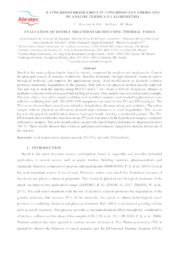Evaluation of double treated starches using thermal tools.
Evaluation of double treated starches using thermal tools.
Author(s): SIQUEIRA, G. L. de A. de; LAZZAROTTU, S. R. da S.; HORNUNG, P. S.; SILVEIRA, A. C. da; BANNACH, G.; SCHNITZLER, E.; LAZZAROTTO, M.
Summary: Starch is the main polysaccharide found in cereals, composed by amylose and amylopectin. Corn is the principal source of starches worldwide. Starches treatment, through physical, chemical and/or biological methods, can improve the applications range. Acid modification in alcoholic solution promotes minimally degradation in the granule. Ball mill is one physical method poorly explored. The aim was to treat the starches using HCl 0.5 mol L-1 for 1 hour in 100 ml of aqueous, ethanol or methanol solutions with subsequent ball milling processes. One sample was selected as native sample. The four others, one native sample and three acid modified samples, were treated by physical process with the oscillating ball mill. The DTG-60H equipment was used for the TG and DTA analysis. The TG curves showed three mass losses related to dehydration, decomposition and oxidation. The native sample without physical modification showed major resistance to total degradation. This occurs because the physical modification cleaves hydrogen bonds, leaving a weakened granule. The TGDTA results showed that the mass loss in the 2nd event was minor in the hydrolyzed samples compared with native samples. The acid modification can provide starch higher resistance to degradation up to 340 °C. These results showed that chemical and physical treatment changed the thermal behaviors of the starches.
Publication year: 2016
Types of publication: Paper in annals and proceedings
Unit: Embrapa Forestry
Keywords: Amido, Análise térmica, Ball mill, Moinho de bolas, Starch, Thermal analysis
Observation
Some of Embrapa's publications are published as ePub files. To read them, use or download one of the following free software options to your computer or mobile device. Android: Google Play Books; IOS: iBooks; Windows and Linux: Calibre.
Access other publications
Access the Agricultural Research Database (BDPA) to consult Embrapa's full library collection and records.
Visit Embrapa Bookstore to purchase books and other publications sold by Embrapa.

